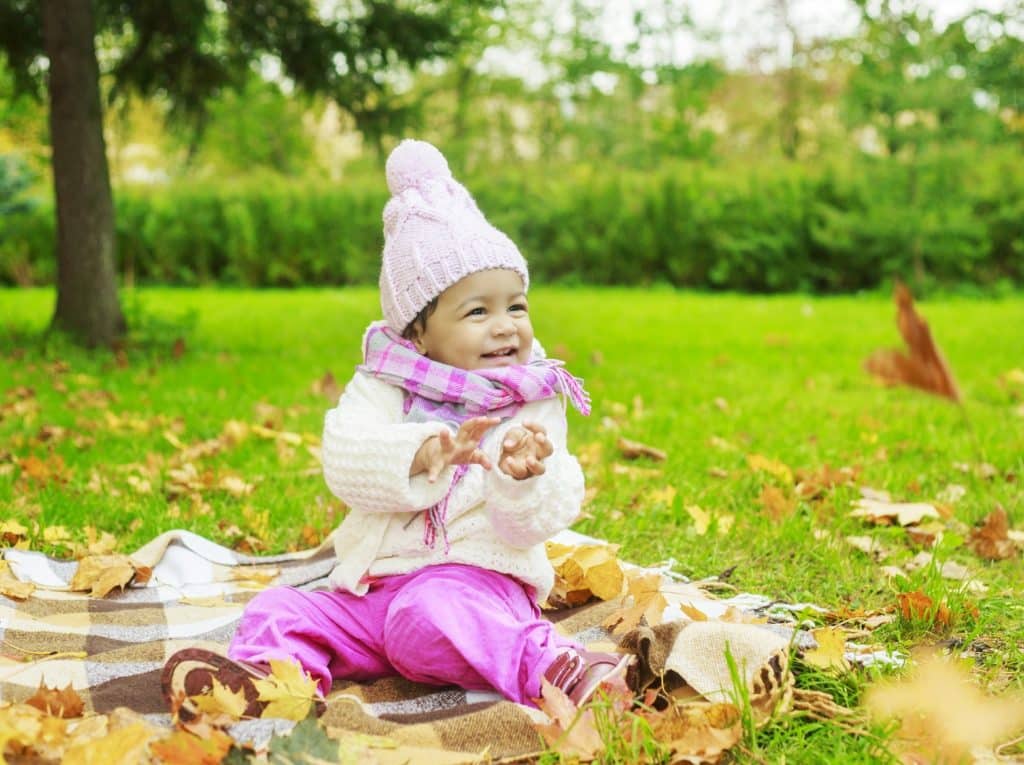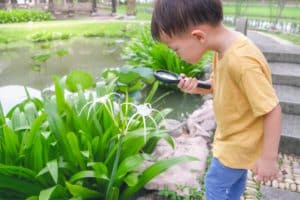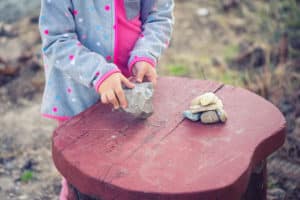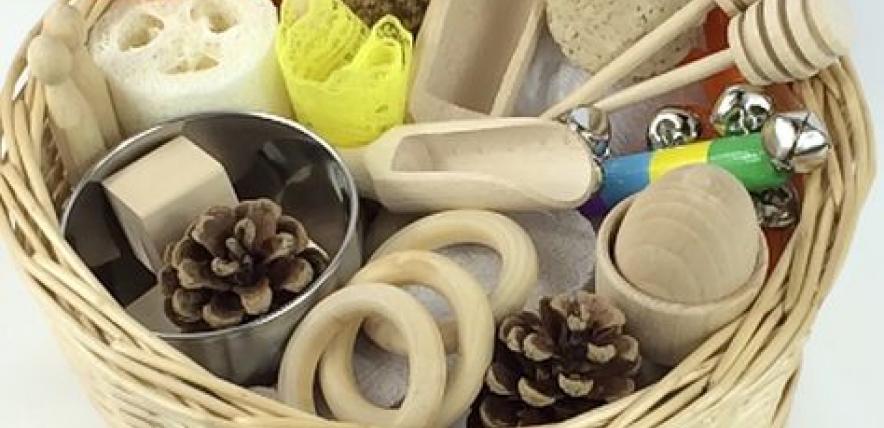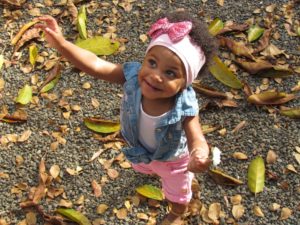Early Years lecturer and trainer Bernadette Burnett explains why children should take a break from plastic toys and reap the benefits of natural materials instead.
When Birthdays and Christmas start approaching, you may dread the thought of your living room filling up with more plastic toys that are not only expensive but often go out of favour quickly too. The lure of toys can be irresistible especially when you or your child may have seen adverts on television or videos of people playing with toys on YouTube. But have you noticed how often when a young child opens a present they end up playing with the wrapping paper or the cardboard box it came in, instead of the actual toy? That’s because natural materials such as paper and cardboard offer children myriad play opportunities and can be real treasures when it comes to exploring. A cardboard box can be a boat, a train, a car or a den!
Nature’s gifts
Natural materials are nature’s gifts that can keep on giving in terms of meaningful play experiences for babies and young children. Cardboard toilet roll tubes, wooden spoons, wooden pegs, pine cones, large smooth stones (only for older children who won’t put them in their mouths), metal spoons, scraps of material can all prove fascinating for little hands and minds.
Natural play the ‘Heuristic’ way
Babies and toddlers’ senses benefit from exploring natural materials independently. Playing in this way is often referred to as Heuristic play. The term ‘Heuristic play’ was coined by child psychologist Elinor Goldschmeid in the early 1980’s and is the process of babies and young children exploring the properties of real world ‘objects’ made from natural materials. By giving young children first hand play experiences that encourage them to play ‘autonomously,’ they can make decisions and enjoy investigating an array of natural objects with their senses. This in turn can result in the children responding to the feel and textures of natural objects in ways that come naturally to them, and can be wonderful to watch their reactions to new sensations.
Shared play experiences
Providing opportunities to play with natural materials at home and when getting together with friends is something readily accessible and cost effective. I am a great champion of playing with natural materials for many reasons. Above all though, the fact families probably have many materials that support this type of play already without spending anything extra to acquire them is a winner. Organising playtimes with friends, having this type of play in mind, could result in a wonderfully shared enriching play experience for young children, particularly if parents and carers can swap and share natural materials they have.
Ideas for games with your child include:
- Peekaboo with pieces of material
- A puppet show out of wooden spoons with faces drawn on and material attached as clothing
- A simple memory game using boxes or baskets to hide small natural objects.
Some ideas for games that encourage shared play for toddlers and young children:
- Counting objects
- Making dens from cardboard boxes
- Using wooden brushes to brushing/ grooming hair in a pretend hairdresser
- To be in a band by banging and tapping pots, pans and wooden spoons
- Making a pretend bonfire from leaves and twigs
- Making figures such as a stick person from twigs
- Using wooden pegs to count and join together to make play figures.
Making treasure baskets or boxes
‘Treasure baskets’ is a great activity for your own young child or could be given as a gift for someone with very young children. The idea is that you fill it with safe, natural materials and objects (make sure there are no choking hazards) that babies and young children can explore independently. So next time you see a basket or box lying around think of all the other natural materials you could fill it with and there you have it — a treasure basket or box in the making!
Here are some examples of what can be included to start you off:
- Non-sharp items of cutlery
- Metal or wooden cooking utensils
- Cardboard egg boxes
- Various types of recycled paper and card
- Fleecy pieces of material
- Woollen items such as hats
- Citrus fruits
- Leather items such as a purse
- Large shells
- Metal keys
- Bathing and grooming goodies made from natural materials such as loofahs, nail brushes and hair brushes.
These objects and materials will require regular safety checks and cleaning or discarding where necessary for hygiene purposes. Rotating the contents to keep little ones interested is important too. If you’re making a treasure basket or box as a gift, you could jazz it up by decorating it with recycled paper and card. You could even add a note to your gift explaining how these natural material objects will be good for little fingers to explore.
Back to nature
Don’t let this time of year put you off — get your extra layers on and get to the park. Take a bucket or box with you to collect pine cones, leaves, twigs etc and you have an instant nature walk!
Nature may not be for all
It is important to consider some children will not enjoy this type of play. We as adults do not enjoy the feel and texture of things at times and neither do some babies or young children. However if a child is completely adverse to sensory play with various natural materials, it’s worth keeping an eye on this as they grow and develop. It is important to know that young children mostly grow out of their aversions to things or cope better as they grow. However if the aversions continue it’s worth discussing concerns with your GP, health visitor, early years practitioner, teacher, SENCO etc, as with any concern, so they can be monitored and investigated further if need be.
The most natural thing of all
When it comes to gift-giving and keeping it under control, I’ve often heard parents discussing the concept of ‘Something they want, something they need, something to wear, something to read’. Natural materials can cover many if not all of these suggestions — for example wooden toys, colouring pencils and paper, a woolly hat and a book. But whatever you choose to buy or to play with over the holidays, don’t forget the most natural and beneficial thing for your child will be— plenty of face to face play time with YOU and your family.


